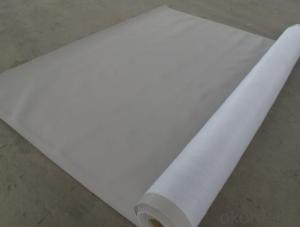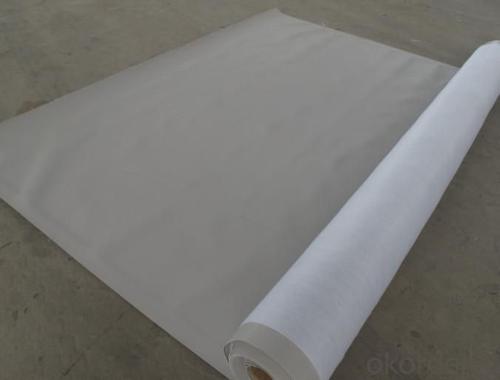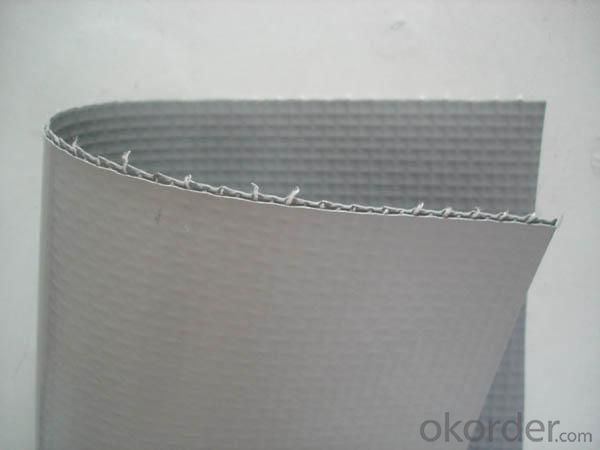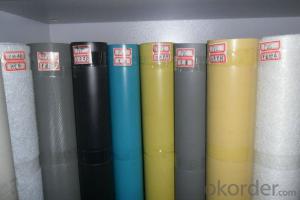PVC waterproof membranes
- Loading Port:
- China Main Port
- Payment Terms:
- TT OR LC
- Min Order Qty:
- -
- Supply Capability:
- -
OKorder Service Pledge
OKorder Financial Service
You Might Also Like
PVC Waterproof Membrane
Production description
The PVC waterproofing(waterproofing membrane)rolls formulas are based upon polyvinyl chloride
resin with other assistants added to provide flexibility and stability such as anti-oxidant,absorbent of
ultraviolet light, plasticizer and plastic filling agent
Features:
1. Exposed to sunshine: UV rays resistance, long service life and aging resistance
2. Easy installation and dimensional stability: can be wieldable under wide range of temperature and
experience minus dimensional change in thermal treatment
3. High tensile strength and elongation thus can accommodate movements of substrates
4.Good flexibility under low temperature, good adaptability to ambient temperature difference
5, Secure anti-puncture and good rooting resistance, no pollution caused to environment when being
welded and good waterproofing choice for plant roofs
6. Good plasticity: convenient and fast treatment of detailed parts of corners and edges
7. 2 meters width reduce the joints and help saving materials or labor cost
Product categories:
(1.UV rays resistance 2.long service life and aging resistance
3.green product 4.high tensile strength)
1.pvc waterproofing membranes with smooth(PVC-H),
2.PVC membranes with no-woven fiber composite backing sheet(PVC -L),
3.glass fiber reinforced PVC membranes(PVC-G),
4.fabric reinforced PVC membranes with fiber(PVC-GL).
application range
Widely applied on various kinds of waterproofing projects:
1.Subways and tunnels
2. Roofs of sports complex
3. Green roofs
4. Exposed roofs
5. Steel roofs
6. Waste land filling yards
7. Basements
- Q: Are waterproofing membranes suitable for below-grade applications?
- Yes, waterproofing membranes are suitable for below-grade applications. Waterproofing membranes are specifically designed to prevent the infiltration of water into below-grade structures such as basements, foundations, and retaining walls. These membranes are made from durable materials that can withstand the pressure of soil and water, ensuring long-term protection against leaks and water damage. They are typically installed on the exterior side of the below-grade structure to create a barrier that prevents water from seeping through the walls or floors. Additionally, waterproofing membranes are flexible and can accommodate structural movements, ensuring their effectiveness even in challenging below-grade environments. Overall, waterproofing membranes are a reliable and effective solution for protecting below-grade structures from water intrusion.
- Q: Can a waterproofing membrane be used for wastewater treatment plants or sewage facilities?
- Yes, a waterproofing membrane can be used for wastewater treatment plants or sewage facilities. These facilities often require protection against water infiltration and leakage due to the presence of large amounts of water and potentially corrosive substances. A waterproofing membrane is a versatile solution that can provide a barrier against water penetration, helping to prevent damage to the structure and ensure the proper functioning of the facility. It can be applied to various areas such as walls, floors, roofs, and tanks, helping to maintain a watertight environment and prolong the lifespan of the facility. Additionally, some waterproofing membranes are specifically designed to withstand harsh chemicals, making them suitable for wastewater treatment plants and sewage facilities where corrosive substances may be present.
- Q: Can a waterproofing membrane be used for vehicular traffic areas?
- Yes, a waterproofing membrane can be used for vehicular traffic areas. Waterproofing membranes are designed to protect surfaces from water damage, and they can also provide protection against other elements such as chemicals, oils, and fuels. When applied correctly, a waterproofing membrane can create a durable and long-lasting surface that can withstand vehicular traffic.
- Q: How does a waterproofing membrane handle freeze-thaw cycles?
- A waterproofing membrane is designed to handle freeze-thaw cycles by being flexible and resistant to cracking. It should be able to expand and contract with temperature fluctuations without compromising its waterproofing properties. Additionally, it should have good adhesion to the substrate to prevent water infiltration and damage during these cycles.
- Q: Is a waterproofing membrane resistant to punctures?
- Yes, a waterproofing membrane is generally designed to be resistant to punctures. It is engineered with durable materials and reinforced to provide protection against puncturing forces, ensuring its longevity and effectiveness in preventing water penetration.
- Q: Can a waterproofing membrane be used on TPO roofs?
- Yes, a waterproofing membrane can be used on TPO roofs. TPO (thermoplastic olefin) is a popular roofing material that is known for its durability and energy efficiency. However, like any roofing material, TPO roofs can still be susceptible to leaks and water damage over time. To enhance the waterproofing capabilities of a TPO roof, a waterproofing membrane can be applied. A waterproofing membrane is a thin layer of material that is designed to prevent water infiltration. It is typically made from synthetic materials such as modified bitumen, EPDM, or PVC. These membranes are highly effective in creating a barrier against water, protecting the underlying roof structure from leaks and potential damage. When applying a waterproofing membrane on a TPO roof, it is important to ensure compatibility between the materials. The membrane should be specifically designed for use on TPO roofs and should be approved by the manufacturer of the TPO roofing system. This will ensure that the membrane is compatible with the TPO material and will not cause any adverse reactions or void any warranties. The installation of a waterproofing membrane on a TPO roof typically involves cleaning and preparing the surface, applying a primer if necessary, and then adhering the membrane to the roof using an appropriate adhesive or heat welding method. Once installed, the membrane acts as an extra layer of protection, preventing water from penetrating the TPO roof system and causing damage. In conclusion, a waterproofing membrane can be used on TPO roofs to enhance their waterproofing capabilities and protect against leaks. However, it is important to choose a membrane that is specifically designed for use on TPO roofs and is approved by the manufacturer of the TPO roofing system. Proper installation and regular maintenance will ensure the longevity and effectiveness of the waterproofing membrane on a TPO roof.
- Q: What is the cost of installing a waterproofing membrane?
- The cost of installing a waterproofing membrane can vary depending on several factors such as the size of the area to be waterproofed, the type of membrane used, and the complexity of the installation. On average, the cost can range from $3 to $10 per square foot. However, it is recommended to obtain quotes from professional contractors to get an accurate estimate for your specific needs.
- Q: Can a waterproofing membrane be used on tunnels with electrical installations?
- Yes, a waterproofing membrane can be used on tunnels with electrical installations. These membranes are designed to provide a protective barrier against water ingress, ensuring the safety and functionality of electrical installations in tunnels.
- Q: Can a waterproofing membrane be used in conjunction with other waterproofing methods?
- Indeed, the utilization of a waterproofing membrane in conjunction with other waterproofing methods is possible. In fact, it is quite customary to amalgamate multiple waterproofing techniques in order to offer augmented defense against water intrusion. Primarily, waterproofing membranes are frequently employed as the main layer of waterproofing, serving as a shield against water infiltration. Nevertheless, these membranes can be further reinforced through the utilization of other approaches including sealants, coatings, or drainage systems. These supplementary methods aid in addressing specific vulnerabilities, such as cracks, joints, or areas susceptible to high water pressure. Through the amalgamation of various waterproofing techniques, it becomes feasible to establish a comprehensive and efficacious waterproofing system that provides utmost safeguarding against water damage.
- Q: Can a waterproofing membrane be used for planter boxes?
- Yes, a waterproofing membrane can be used for planter boxes to prevent water leakage and protect the surrounding surfaces from moisture damage.
Send your message to us
PVC waterproof membranes
- Loading Port:
- China Main Port
- Payment Terms:
- TT OR LC
- Min Order Qty:
- -
- Supply Capability:
- -
OKorder Service Pledge
OKorder Financial Service
Similar products
Hot products
Hot Searches
Related keywords


























